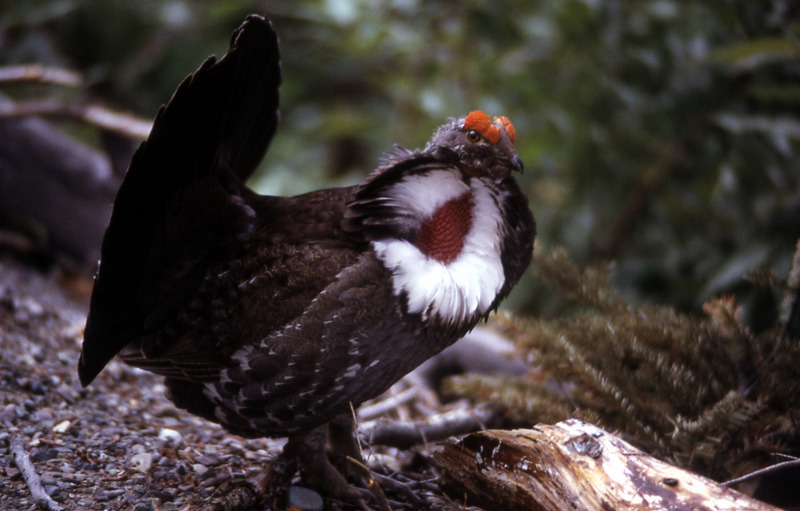|
| 질의: animalia | 결과: 222번째/289 | |
Blue Grouse (Dendragapus obscurus) - Wiki
| 제목: | Blue Grouse (Dendragapus obscurus) - Wiki
| |

| 해상도: 1999x1277
파일크기: 337508 Bytes
등록시간: 2007:10:25 17:57:26
|
Blue Grouse
From Wikipedia, the free encyclopedia
[Photo] Blue Grouse (Dendragapus obscurus); Male Dusky Grouse displaying, Yellowstone NP; note purple air sac and red eye wattle. US NPS photo (http://www.nps.gov/archive/yell/slidefile/birds/gallinaceous/Page.htm). License: public domain.
Scientific classification
Kingdom: Animalia
Phylum: Chordata
Class: Aves
Order: Galliformes
Family: Tetraonidae
Genus: Dendragapus Elliot, 1823
Species
Dusky Grouse Dendragapus obscurus
Sooty Grouse Dendragapus fuliginosus
Synonyms: Palaeotetrix
"Blue Grouse" is a name for the union of the Dusky Grouse Dendragapus obscurus and Sooty Grouse Dendragapus fuliginosus as one species of forest-dwelling grouse.
Blue Grouse
The species discussion
After the split of Dendragapus, "Blue Grouse" can now be used as an English-language alternative to the genus name Dendragapus. "Blue Grouse" are large grouse that inhabit highland regions of western North America, the Sooty Grouse in the Pacific Coast Ranges and Sierra Nevada, and the Dusky Grouse in the Rocky Mountains. These two taxa were originally regarded as separate species, but were considered conspecific for much of the twentieth century. However, in 2006 the American Ornithologists' Union re-split them, following the DNA-based work of Barrowclough et al. (2004). whose results supported the earlier work of Brooks (1929) who regarded the two taxa as separate species based on morphology, behavior and vocalizations. The precise ranges of the two species are well-defined in the south, separated by extensive areas of unsuitable forest-free habitat, but somewhat uncertain in the north of the range of the genus where there is no separation; Barrowclough et al.'s study did not include these northern populations.
Adults have a long square tail, gray at the end (lighter in the Sooty Grouse). Adult males are mainly dark (especially Sooty Grouse) with a yellow (Sooty Grouse) or purplish (Dusky Grouse) throat air sac surrounded by white, and a yellow (Sooty Grouse) or yellow to red (Dusky Grouse) wattle over the eye during display. Adult females of both species are mottled brown with dark brown and white marks on the underparts.
Their breeding habitat is the edges of conifer and mixed forests in mountainous regions of western North America, from southeastern Alaska and Yukon south to California and New Mexico. Their range is closely associated with that of various conifers. The nest is a scrape on the ground concealed under a shrub or log.
They are permanent residents but move short distances by foot and short flights to denser forest areas in winter, with the odd habit of moving to higher altitudes in winter.
These birds forage on the ground, or in trees in winter. In winter, they mainly eat fir and douglas-fir needles, occasionally also hemlock and pine needles; in summer, other green plants (Pteridium, Salix), berries (Gaultheria, Mahonia, Rubus, Vaccinium), and insects (particularly ants, beetles, grasshoppers) are more important. Chicks are almost entirely dependent on insect food for their first ten days.
Males sing with deep hoots on their territory and make short flapping flights to attract females. Females leave the male's territory after mating.
Both species have healthy populations, except for some decline and range loss in Sooty Grouse at the southern end of its range in southern California.
Fossils
Late Pleistocene fossil species that have been described are Dendragapus gilli (western and west-central USA), initially placed in a distinct genus Palaeotetrix, and Dendragapus lucasi (known only from Fossil Lake, USA), although as the Falcipennis grouse were formerly included in Dendragapus, it is not completely certain that these fossils are correctly assigned here.
http://en.wikipedia.org/wiki/Blue_Grouse
| The text in this page is based on the copyrighted Wikipedia article shown in above URL. It is used under the GNU Free Documentation License. You may redistribute it, verbatim or modified, providing that you comply with the terms of the GFDL. |
|
^o^
동물그림창고 똑똑전화 누리집
^o^
|
|